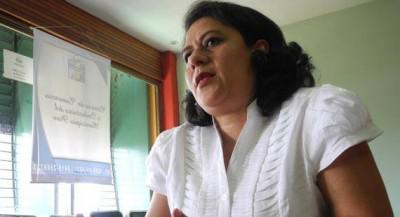
Alicia Sepúlveda, chief economist and project manager. (Photo: CEDICE)
“In life, everyone chooses the role they want to play, and I chose the role of an economist who believes in freedom…Freedom is a precious treasure, that some say is only valued when it’s lost. Nevertheless, happen what may happen, I want to remember that I fought with the Generation of Knowledge for a free society.” This is what motivates Alicia Sepúlveda to get out the door every day and head to her job as the chief economist and project manager at the Center for the Dissemination of Economic Knowledge (CEDICE), a CIPE partner which was recently ranked the 9th best think tank in Central and South America .
Last week, the University of Pennsylvania’s Think Tanks and Civil Societies Program released the 2011 Global Go-To Think Tank Rankings, in which experts rated more than 5,000 think tanks from around the world in 30 different categories. Venezuela-based CEDICE also came in at 17th in the world in terms of impact on public policy — the only Latin American think tank on that list. Another CIPE partner, the Center for the Implementation of Public Policies Promoting Equity and Growth (CIPPEC) in Argentina, was ranked the fifth best in Central and South America.
Passionate, dedicated staff like Sepúlveda are just one ingredient top think tanks, which play an important, if often undervalued, role in democratic societies. Successful think tanks not only foster informed, democratic debate of public policies, but also serve to bridge gaps between lawmakers, civil society, and the general public.
These gaps include the “Operational Gap,” referring to policymakers’ lack of access to tools or information necessary to respond to contemporary challenges and issues. In countries where policymakers don’t have access to reliable research or data, it is hard to make rational policies that are good for the country.
Effective think tanks also help to close the “Participatory Gap,” which arises from the self-perceived exclusion of individuals and private organizations from the policy-making process – that is, the situation where people choose not to participate in policy debates because they do not think they will be heard.
Successful think tanks coordinate policy discussions among civil society and provide a vital voice to economic constituencies. In fact, think tanks can be among the only sources of reliable economic information and data, especially in emerging market countries. Although think tanks represent just one aspect of a vibrant civil society, in many ways they have become the most influential voice of civil society in global policymaking, and can often act as a barometer of the state of a given country’s civil society.
Think tanks can play an important role even in countries where freedom of speech and political participation are limited. For example, the fact that a think tank like CEDICE can operate and impact public policy in a place that is ranked 96th out of 165 countries in democratic freedoms (according to the Economist’s Democracy Index 2010) shows remarkable hope for democracy in Venezuela.
CIPE and CEDICE have worked together since 1995 on projects that have varied in scope from training journalists on economic reporting to employing cost-benefit analysis to evaluate economic legislation and provide informed policy analysis for the public and legislators. Legislators frequently use CEDICE’s analysis in their presentations in the National Assembly, and CEDICE is the most-quoted NGO in the Venezuelan media. The Go-To Think Tank rankings show that CEDICE’s work, with CIPE support, is paying off.
The success CEDICE strives for does not happen overnight. In order to excel at advocacy, a think tank like CEDICE must conduct thorough, objective research, and be able to make their analysis easily consumable. It also requires constant effort from people like Alicia Sepúlveda who truly believe in the organization’s mission.
Even after a full day of economic analysis, phone calls and meetings with legislators, writing press releases, coordinating events, and more, Sepúlveda is not always ready to leave when the day is over. That’s what fighting for a cause you believe in – to promote liberty, entrepreneurship, and free enterprise – looks like. That is the precious treasure she, CEDICE, and CIPE, are working together to protect.

